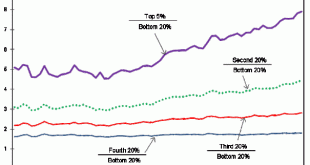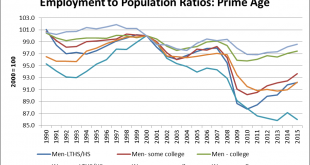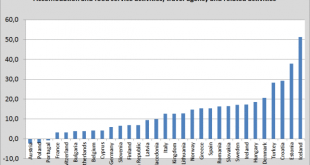Paul Romer has just published a devastating critique of DSGE (or, in his parlance, ‘Post Real’) macro models. He’s not the first important insider to write an article like this. Look here for Paul Krugman, ‘How did economists get it so wrong‘. Look here for Willem Buiter, ‘The unfortunate uselessness of most ‘state of the art’ academic monetary economics’. Look here for Charles Goodhart, ‘Whatever became of the monetary aggregates‘. And look here for the insider of insiders, Olivier...
Read More »US income inequality began to worsen after 1970
Exhibit 10 from The other half of macroeconomics and the three stages of economic development Richard C. Koo
Read More »Inheritance taxes, equity, and the gift
from David Ruccio You’d think a Harvard economics professor would be able to do better than invoke horizontal equity as the sole argument for reducing the U.S. inheritance tax. But not Gregory Mankiw, who uses the silly parable of the Frugals and the Profligates to make his case for a low tax rate on the estates of the wealthiest 0.2 percent of Americans who actually owe any estate tax.* I’ll leave it to readers to judge whether or not it’s worth spending the time to compose a column on a...
Read More »Men who don’t work: when did economists stop being wrong about the economy?
from Cherrie Bucknor and Dean Baker The 4.9 percent unemployment rate is getting close to most economists’ estimates of full employment. In fact, it is below many estimates from recent years and some current ones. Many policy types, including some at the Federal Reserve Board, take this as evidence that it’s necessary to raise interest rates in order to keep the unemployment rate from falling too low and triggering a round of spiraling inflation. The argument on the other side is first...
Read More »Dean Baker
Light the fires
Read More »“Who will own the robots?”
from David Ruccio I’ve been writing for some years now about the emergence of new technologies, especially automation and robotics, and their potential contribution to raising already-high levels of inequality even further. The problem is not, as I have tried to make clear, technology per se but the way it is designed and utilized within existing economic institutions. In other words, the central question is: who will own the robots? If capital owns the robots, even if their development...
Read More »The US Federal Reserve must rethink how it tightens monetary policy
from Thomas Palley After more than 7 years of economic recovery, the Federal Reserve is positioning itself to tighten monetary policy by raising interest rates. In light of the wobbly reaction in financial markets, an important question that must be asked is whether raising interest rates is the right tool. It could well be that the world’s leading central bank is going about the process of tightening in the wrong way. Owing to the dollar’s preeminent standing, that could have severe...
Read More »Protest of the century
David Ruccio During the past couple of weeks, the only real India economic news in the Western press was the decision by “the Ranbir Kapoor of banking,” Raghuram G. Rajan, to step down from his position as the head of the Reserve Bank of India. But we read almost nothing about the 2 September nationwide strike by 150 million Indian workers [ht: Magpie], which was certainly the largest strike in India’s long labor history—and may have been the largest general strike in world history. As...
Read More »As UK productivity growth falls to zero, John Harris at the Guardian tells readers that technology is making old workplace relations obsolete
from Dean Baker The efforts by many elite types to deny basic statistics and to tout the new technologies transforming the workplace are truly Trumpian in their nature. According to the OECD, productivity growth in the UK was essentially zero between 2007 and 2014 (the most recent year for which it has data). So we would naturally expect that the Guardian would run a column telling us that globalization and new technologies are making old workplace relations obsolete. As John Harris tells...
Read More »Schumpeter and aggregate demand
Did low interest rates contribute to the growth of tourism and tehrewith to higher aggregate demand? Yes. but not like the models predict. Lower rates on existing debts (instead of on new loans) fired the animal spirits of consumers (instead of producers). In normal times, Italy would have been hailed, by EU officials, as a beacon and an example of succesful development of one of its main sectors, tourism. Nowadays, the growth of employment in Italian tourism (+10% in three years, which...
Read More » Real-World Economics Review
Real-World Economics Review





